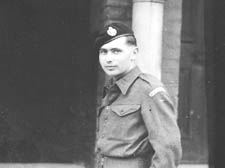|
|
 |
| |

Roy Shaw - the young serviceman |
A life spent on the front lines of public service
ROY Shaw, the longest-ever serving councillor in Camden Council history,
has died aged 82.
Cllr Shaw, who lived all his life in Camden, will be remembered for his unstinting dedication to public service which lasted a lifetime, from his role on the battle fields of the Second World War through to his loyal service at the Town Hall, which lasted 50 years.
Roy was born in 1925. His family lived in Highfield Road, West Hampstead, and he was the only son born in a family that boasted six children.
He went to Emanuel School in West Hampstead and then to William Ellis. The school in Highgate Road was evacuated to Leighton Buzzard when war broke out. He turned 16 in 1941 and became a clerk until he was old enough to be called up.
Roy joined the army in December, 1943, and after six weeks’ basic training joined the Royal Armoured Corps. He was sent to France with a tank as a reinforcement in August 1944. He had a number of terrible experiences, but his good humour meant he was able to talk candidly about being involved in the battle for Europe.
He said at the celebration of his 50th anniversary as a councillor: “Before I was sent to France, the German High Command obviously got wind I was shortly to land in Normandy and, as a result, decided to begin the total retreat.”
But his humour masked some life-defining experiences he had to come to terms with. He was one of a crew of four, and his job was to operate a radio, load a 17-pounder gun and a Browning machine gun, as well as make the tea and dinner – a job which was made a little easier by the fact his tank was meant to carry a crew of five but only had four on board. It meant he had an extra ration pack to divvy up.
He was at the forefront of the push to liberate France – the Sherman tank he was driving was reckoned to be the fourth to cross the Rhine into Germany – and he lived through dangerous scrapes.
He once revealed how a tank commander in a vehicle next to him had his head blown off as they chatted. He also recalled turning his tank round a corner in a small Belgian town to be confronted by the superior Panzer tank. He would say with a glint in his eye that he took evasive action: he slammed his vehicle into reverse and quickly got out of the way.
His regiment saw 40 per cent of his comrades killed and wounded, but Roy used this terrible figure as a spur to enjoy life. He joked at his anniversary party: “Army life was tough, but good training for Camden Labour Group meetings in
the 1970s and 1980s.”
He was not demobbed until 1947, and then applied to become a civilian intelligence officer – he had learnt German at William Ellis and was posted to Germany, helping gather information on the British- Russian border.
He recalls feeling despondent that he was not old enough to vote in the 1945 elections – “but the look of gloom on the faces of the very ‘county’ officers were a joy to behold when the results came through”.
Roy joined the Labour Party in 1948 and was involved in the 1951 general election in Hampstead. It led him to resign from his work for Whitehall and he became the secretary for the Hampstead Labour group.
It started Roy on a career in local government that lasted for the rest of his life.
He won election to Hampstead Borough Council in 1956 and then became an Alderman for St Pancras. When Camden was formed in 1965, he continued as an alderman.
Roy’s tenure saw him serve on various committees and boards: he chaired the planning, finance, policy and resources, contract services committees at various times, and served the party well. He was a chief whip from 1965 to 1973, the deputy leader of the council twice and the leader from 1975 to 1982. He was also awarded an OBE in 1991 for his role in helping to set up the Audit Commission.
He was a demon at the Guardian cryptic crossword and had an encyclopedic knowledge of classical music and opera. He would head down to Spitalfields at weekends to trawl the flea markets for old 78s and other LPs, and had a massive collection of opera. He would also treat himself and friends to concerts, regularly heading to Sadler’s Wells and Covent Garden.
Roy never married but earned a reputation as a charming man who enjoyed the company of women. He had a number of girlfriends.
In his later years he left his small bedsit in Malden Road and was cared for first at Wellesley Road old people’s home and then at Ascham Court in Kentish Town.
Friend and former Labour councillor Dermot Greene would occasionally accompany Roy to his favourite pub, the Sir Robert Peel on the corner of Queens Crescent.
When illness meant he had not visited for months, Dermot recalls Roy being treated like a returning hero by regulars when he walked in for a beer.
His funeral is due to be held on at 3pm on Friday January 18 at Golders Green crematorium, Hoop Lane. There will be a wake afterwards at the Spaniards Inn, Spaniards Lane, Hampstead, and all are welcome. |
 |
|
|
 |
|
 |
|